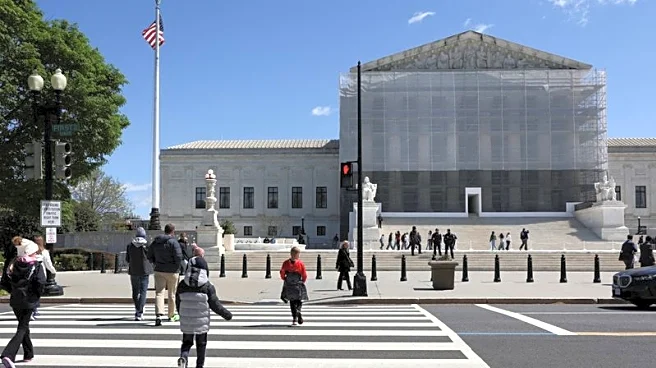By John Kruzel
WASHINGTON (Reuters) -The U.S. Supreme Court postponed on Wednesday a decision on whether to let Donald Trump remove the government's top copyright official in the latest battle over the Republican president's targeting of federal officials.
The action by the justices temporarily leaves in place Shira Perlmutter as the U.S. register of copyrights and director of the U.S. Copyright Office after a lower court blocked Trump's firing of her while her legal challenge to her removal proceeds.
The Supreme Court's order indicated that it would issue a decision on Perlmutter's case after it hears arguments that have already been set in two other cases involving Trump's firing of a Democratic member of the Federal Trade Commission and his attempt to fire Federal Reserve Governor Lisa Cook.
Perlmutter was notified on May 10 by a Trump administration official that she had been fired. Her duties as the government's top copyright official have included serving as the primary adviser for Congress on copyright issues.
Trump's move to terminate Perlmutter came a day after her office circulated a report finding that some unauthorized uses of copyrighted works carried out by tech firms to train generative artificial intelligence systems may be unlawful. Her lawyers have said in legal papers that Trump sought to remove her from her job because he disagreed with the report's findings on AI.
Trump in mid-May also fired Librarian of Congress Carla Hayden, who has not challenged her removal. The president then moved to replace Hayden with Todd Blanche, his former criminal defense attorney and current deputy attorney general, the No. 2 role at the Justice Department.
Blanche, in his capacity as acting head of the Library of Congress, which oversees the U.S. Copyright Office, purported to ratify Trump's decision to remove Perlmutter.
Perlmutter on May 22 sued to block her firing. She argued among other things that Trump lacked the authority to appoint Blanche as acting Librarian of Congress because that office is not an executive branch agency, but rather is part of the legislative branch.
The U.S. Constitution divides the powers of the U.S. government among the executive, legislative and judicial branches.
Washington-based U.S. District Judge Timothy Kelly, a Trump appointee, in July rejected Perlmutter's request to preliminarily block her firing, finding she had not suffered "irreparable harm" that would justify reinstating her.
On appeal, a divided three-judge panel of the U.S. Court of Appeals for the District of Columbia Circuit in September embraced Perlmutter's argument and reinstated her while her case continued to play out.
Judge Florence Pan, an appointee of Democratic former President Joe Biden, wrote that Trump's purported ouster of Perlmutter amounted to an "attempt to reach into the Legislative Branch to fire an official that he has no statutory authority to either appoint or remove."
"The president's purported removal of the Legislative Branch's chief adviser on copyright matters, based on the advice that she provided to Congress, is akin to the president trying to fire a federal judge's law clerk," wrote Pan, joined by J. Michelle Childs, a fellow Biden appointee.
The D.C. Circuit's ruling prompted Trump's filing to the Supreme Court. Lawyers for the administration argued in court papers that Trump's appointment of Blanche as acting Librarian of Congress was authorized by federal law. They also argued that Trump's power under the Constitution's Article II, which delineates presidential authority, permitted him to fire Perlmutter directly because her office is part of the executive branch.
The administration has repeatedly asked the justices this year to allow the implementation of Trump policies impeded by lower courts. The Supreme Court, which has a 6-3 conservative majority, has sided with the administration in almost every case that it has been called upon to review since Trump returned to the presidency in January.
The court has in a series of decisions in recent months allowed Trump to remove various officials. It has scheduled arguments in two cases involving presidential powers to remove certain types of officials, including his moves to fire Federal Reserve Governor Lisa Cook and Federal Trade Commission member Rebecca Slaughter.
(Reporting by John Kruzel in Washington and Andrew Chung in New York; Editing by Will Dunham)

















